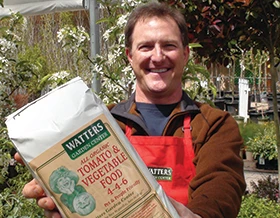
 Q: What kind of garden center can create products with their own brand, or private label? Why should they do so?
Q: What kind of garden center can create products with their own brand, or private label? Why should they do so?
A: I don’t think you have to be large to private label. You can be a $1 to $2 million garden center and still be able to have enough traction to create your own brand, which eliminates competition. So now all of a sudden you can start promoting and talking about a specific product in your community with your gardeners and they can’t go to Home Depot or Lowe’s to pick it up. They have to come to you.
Q: What has been Watters Garden Center’s experience with private labeling?
A: Everything that we do at Watters Garden Center is proprietary based. We want to either mention a product, a plant - let’s say it’s a perennial, an annual, a tree or shrub, that only we will have at that specific time. When we have a radio ad going out, we’re mentioning a purple plum, which is starting to bloom all around the country. We’ll mention a specific variety that we know is not going to be at the box stores. That can be a private label. You’re talking about it and there’s only one place they can get it and it’s at your place. It’s private. We strategize that throughout all of our departments.
We do actually partner with some of our [plant] vendors [to private label varieties]. Let’s say, Sester Farms up in Oregon puts a very fancy, very nice, very flashy label on our conifers that has our name and price on it. It’s got a QR code, too, that refers to our website where they can research more on that particular plant. That’s a private label tree. It appears as though it is unique to Watters Garden Center and it’s just a label they’ve stuck on a tree for us. If you create a partnership strong enough with your vendors, they’ll do that for you.
Q: What about hard goods?
A: We also private label our own mulch, potting soil, top soil and barnyard manure. We partnered with a company that said, “If you’ll pay for the bag, we’ll hold the bag for you and fill it as you request.” That’s been one of the best moves. That got us started into the truly private labeled hard goods in our quest for being different. We really want to stand out in the community. Private labels allow us to do that.
Now it’s gotten so strong that we no longer sell any other SKUs except our own. The Miracle Gros and the other national brands are out. And it’s worked out well for us. People come back and want to buy our product. They ask for it specifically.
Q: How is selling a single line of private labeled products different than selling a variety of brands?
A: It simplifies it for your sales staff, and it simplifies the decision [for customers]. Instead of having three different product SKUs to offer the customer, there’s only one. ‘And let me tell you the best part. We handpicked it and we’re so proud of it,’ they can say. ‘We bagged it ourselves. We created this. It’s our own recipe.’ Give them a story that they can share with consumers that hopefully will enlighten them as to why they want to be shopping independent rather than box stores.

Explore the April 2014 Issue
Check out more from this issue and find your next story to read.
Latest from Garden Center
- America in Bloom announces 2026 program launch and celebrates 25 years of growing vibrant communities
- AmericanHort launches HortCred to advance skills development in the green industry
- Oasis Grower Solutions announces new northeast territory sales manager
- Amanda Solliday named senior manager of Sustainabloom
- New McCarthy-Family Flowers Legacy Fund supports multi-generational retail florists
- Monrovia releases new retail program, Landscape Legends, to mark 100th anniversary
- USDA to conduct 2025 Organic Survey
- Save the date for the 78th Santa Barbara International Orchid Show





